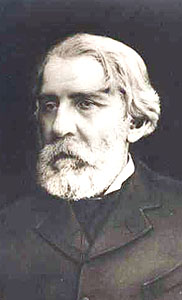Turgenev grew up in a wealthy family and was well-educated both in Russia and abroad, and he traveled widely in Europe. In his later life, he mostly lived in Western Europe, especially France. By the 1850s, he had become convinced of the need for Russia to modernize. With the appearance of his collection of short stories, Zapiski okhotnika (A Sportsman's Sketches, 1852), Turgenev's literary reputation was sealed; legend has it that the stories helped to convince Tsar Alexander II of the need to liberate the serfs. The stories were a landmark in the development of Russian literature--no, actually, of Russian culture--For the first time, Russian peasants were depicted/described in realistic terms. "Wake up Russia, the peasants are Russian too!" (Hard to believe today what a revelation that was for Russian intellectuals and nobles! The Sketches, which are short and easy to read, are still considered to be some of the best in the Russian literary tradition.
Then in 1862, Turgenev published Ottsy i deti (Fathers and Sons), one of the truly great works of nineteenth-century fiction (and not just Russian fiction). The novel crystallized the philosophical and emotional issues ranging in Russia at the time and examined the conflict between the older generation that had come of age in the 1840s (the Romantics) and a younger generation (the Nihilists) that was reluctant to accept the current status quo and the compromises that the older generation had lived by. For the central character, Bazarov, Turgenev invented a new word, "nihilist" (which meant a sweeping repudiation and withering critique of the existing order). That word, used as a label, was quickly applied to the Russian populist revolutionaries of the 1860s and 1870s. The hostile reaction of the Russian public to the novel led Turgenev to leave Russia and spend the last twenty years of his life mostly in Europe.
Fathers and Sons is incredibly important to understanding the problems plaguing Russia in the nineteenth century (and it is far more accessible to most readers than the works of Dostoevskii or Tolstoi). It also has a universal appeal. It always reminded me of the 1960s in America with the same generational clash on one level between fathers and sons (sons rebelling to establish their independence), but on another level the real clash of very different cultural value systems.
Here are some websites with more information about Turgenev.
- The Wikipedia entry on Ivan Turgenev. Wiki also has entries for A Sportsman's Sketches and Fathers and Sons.
- There is a very short biography located at www.nndb.com/people/697/000055532/.
- Many of Turgenev's works are available online, especially those translated by Constance Garnett--one of the most influential translators ever of Russian literature. See, for example, a list at www.archive.org. You can also check Project Gutenberg.
- Тургенев Иван Сергеевич: Собрание сочинений (in Russian, of course). Another Russian site, with a short biography, devoted to Turgenev is at www.turgenev.org.ru/Index.html (The English version is www.turgenev.org.ru/en/).
- Tracing Byron's Influence on the Creation and Development of the Nihilist Bazarov in Ivan Turgenev's Fathers and Sons has good information on Turgenev.]
- Le blog du Musee Tourgeniev. Remember that Turgenev spent much of his life in France.
- The full text of Fathers and Sons in the original Russian (Alexei Komarov's Internet Library)
- Cliff Notes, if you must
- Andrew Higgins, Turgenev Dissed Russia but Is Still Lionized as Literary Star by Touchy Kremlin (New York Times, 11 March 2019)
